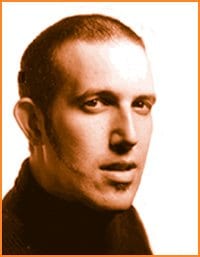What police say is likely yet another screw-up by the 911 emergency service has a gay man fuming.
Billeh Nickerson, a Vancouver poet and frequent contributor to Xtra West, was threatened with violence in the early hours of Jan 1 while standing in line for pizza. But his call to 911 got no immediate police response.
Nickerson and his friend, Matt Davy, were heading home around 2 am from a night at the Dufferin Hotel when they stopped at the Fresh Slice Pizza franchise at 711 Davie St, just west of Granville.
A stranger in line for a pizza started quizzing them about their evening activities. After getting a yes to his question about whether the two men had visited a gay bar that evening, the stranger’s body language changed and he started calling them “fucking faggots,” Nickerson recalls.
Soon, the man escalated the confrontation to yelling that he was going to “kill the fucking faggots.”
Staff at the pizza joint refused to call police or ask the increasingly loud man to leave, says Nickerson. A customer offered to call 911 and soon passed the phone to Nickerson. The gay man says he made clear to the E-Com operator that his life was being threatened by a man using homophobic language and noted that this was a hate crime. Nickerson says he was able to describe the man down to his jewellery for the operator, noted that the perpetrator was still on site and repeatedly gave the exact address.
“They had everything they needed-tons of witnesses and a bang-on description and he’s still there.”
No police arrived.
But at least three police cars drove by while Davy ate three pizza slices.
Remembering the large number of police officers they’d encountered walking along Granville St, the two gay men went in search of help several minutes after the perpetrator left the pizza premises.
Nickerson approached five officers standing near two police cars outside a bar and was promptly lectured for using the word “cop” in place of “officer.” And he was told by one officer that he should never have left the scene that he called from. “He was shutting me down quite aggressively. He started berating me.”
The cops refused to look for the perpetrator and instead went off on a call, says Nickerson. But not before they told him to cut them a break because it was New Year’s Eve.
Soon after he arrived home about an hour after first calling 911, Nickerson received a call there from dispatch. They wanted to know if he still had a suspect outside his home.
“It means they didn’t respond and now it’s an hour later,” he says. And he’s not impressed that dispatch thought the perpetrator was outside his home when he’d repeatedly given the pizzeria’s address to the 911 operator.
Nickerson called the police force’s gay community liaison, Roz Shakespeare, the next day.
Shakespeare points a finger at E-Com, the private-sector service that takes 911 calls. She says Nickerson’s call should probably have been given a high priority and officers immediately dispatched to the scene. Mere shouting and aggressiveness is normally considered merely “creating a disturbance” and assigned a low, third level, priority. But threats of violence, particularly killing, are considered a second level priority. And if the suspect is still on site, as he was in Nickerson’s case, proper procedure calls for immediate dispatch in most cases, says Shakespeare.
But that’s all conditional on the operator believing that the victim truly believes there to be a genuine threat to his life and not merely a threat that is unlikely to be carried out.
The 911 emergency service has been the subject of repeated news reports in Xtra West as gays have complained that their calls for help in verbal and physical bashings have been given low priority.
Insp Val Harrison, the West End’s top cop, says dispatch has to differentiate between a situation that is “horribly offensive” and one in which there is a very real likelihood of extreme violence.
“Did he convey that he was genuinely afraid to 911?”
While she is reluctant to lay blame, Harrison notes that the VPD has “issues” with E-Com.
Nickerson says he was afraid as the perpetrator got louder and more vicious and that he did his best to communicate that fear along with details of the incident as it was unfolding.
“I’m thinking I’ve learned the cops won’t come unless you see a knife. If that’s what gay people have to say, then maybe we should do that.”
Police and 911 operators have to get their heads around the need to respond immediately to threats of homophobic violence, he says. If a hate crime is in progress, police should make it a response priority, he says.
And he’s afraid it will get worse as the Granville Entertainment District grows in popularity just blocks away from Davie Village.
A spokesperson for E-Com was unable to discover what priority an operator assigned Nickerson’s call before passing it on to police. But Clare Marwick says 911 “take our procedures from the police. This is a VPD policy.”
There were 16 calls to 911 from the West End alone in the half-hour period from 2 am to 2:30 when Nickerson called, says Marwick. Nickerson’s 2:10 am call was finally responded to at 5:30 am by the VPD, she says.

 Why you can trust Xtra
Why you can trust Xtra


